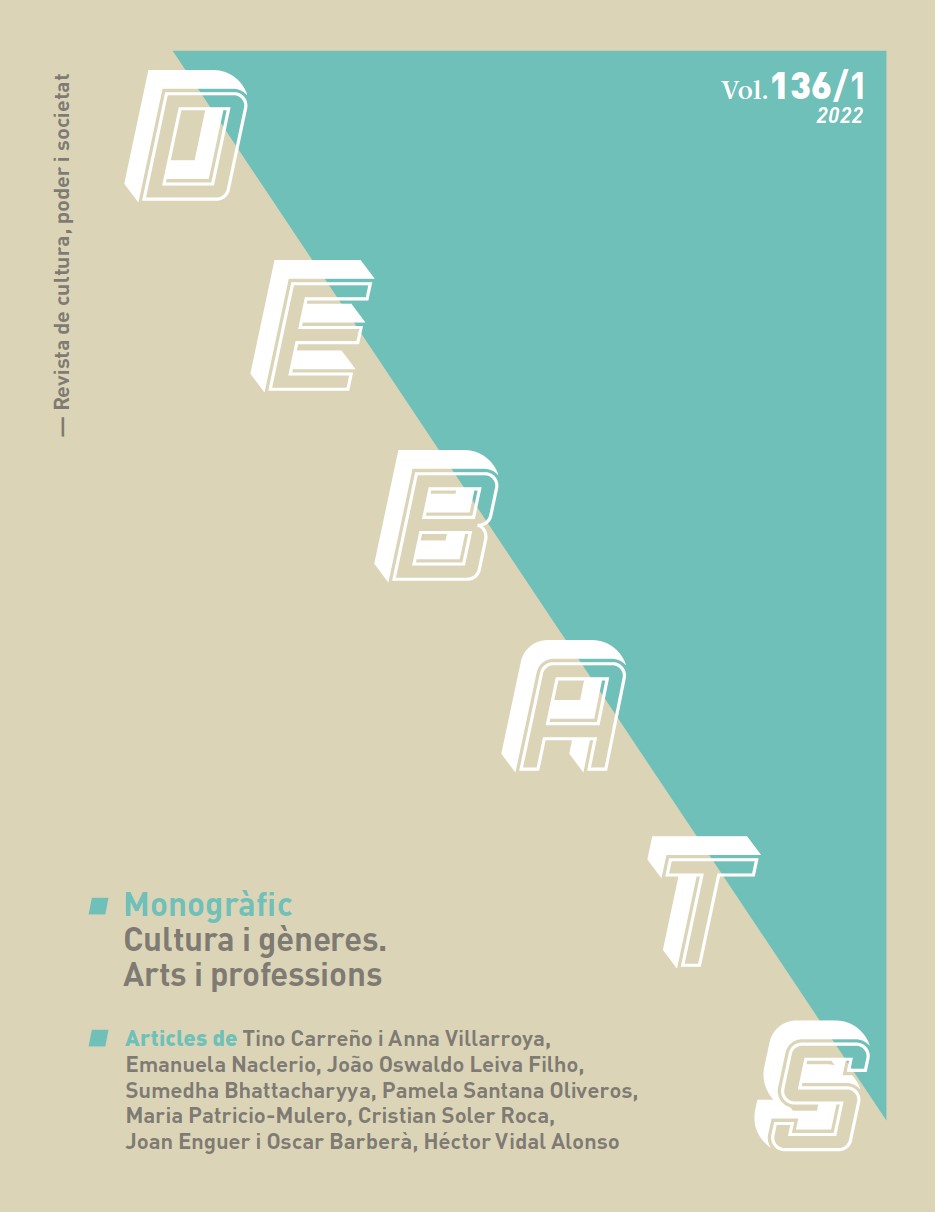Teorías de la conspiración, negacionismo del COVID-19 y movimientos en contra de las medidas para la contención de la pandemia
Abstract
The aim of this present research was to test whether the discourse of groups opposed to the acceptance of COVID-19 preventive measures could be framed within conspiracy theories and to analyse their arguments. This study was conducted using quantitative methodology by applying the technique of content analysis to the messages sent within the denialist collective Docentes por la Verdad Telegram mesanging application group. The data collection timeframe was from December 2020 (when vaccination against COVID-19 started) to May 2021 (when the vaccination schedule for the majority of teachers ended). Systematic sampling with the function K = N/n was used to select sufficient days within this aforementioned date range to comply with a 95% confidence level and error of 5%, resulting in a sample of 124 from a total of 182 days. The pre-coding of the analysis was based on Brotherton’s (2013) characterisation of conspiracy theories and the denialist arguments detected by the Comisión Central de Deontología de la Organización Médica Colegial (Central Commission of Deontology of the Spanish Medical Association; 2020). The results showed that these collectives can be considered conspiracy groups and reaffirmed the arguments of other research groups while also adding some new lines of enquiry.
Downloads
References
Alfonso, I., i Fernández, M. (2020). Comportamiento informacional, infodemia y desinformación durante la
pandemia de COVID-19. Anales De La Academia De Ciencias De Cuba, 10(2). http://www.revistaccuba.sld.cu/
index.php/revacc/article/view/882
Andrade, G. (2020). Belief in Conspiracy Theories About covid-19 Amongst Venezuelan Students: A Pilot Study.
Revista Colombiana de Psicología, 30(1). https://doi.org/10.15446/rcp.v30n1.87357
Borrell, F. (2020). COVID-19, una oportunidad para reflexionar sobre la toma de decisiones en la incertidumbre.
Folia Humanística, 2(3), 1-46. http://doi.org/10.30860/0068
Brotherton, R. (2013) Towards a definition of ‘conspiracy theory’. PsyPAG Quarterly, (88), 9-14. http://www.psypag.
co.uk/the-quarterly/quarterly-back-issues/
CCDOMC (2020). Informe sobre las tesis negacionistas a propósito de la pandemia COVID-19 producida por el SARS-CoV-2.
https://www.cgcom.es/coronavirus/comunicados-comision-central-deontologia
Cruz, M., Rodríguez, A., Hortal, J., i Padilla, J. (2019). Reticencia vacunal: análisis del discurso de madres y padres con
rechazo total o parcial a las vacunas. Gaceta Sanitaria, 33(1), 53-59. https://doi.org/10.1016/j.gaceta.2017.07.004
Da Silva, I., i Da Ulysséa, D. (2020). Entre a pandemia e o negacionismo: a comunicação de riscos da Covid-19 pelo
Ministério da Saúde do Brasil. Chasqui, Revista Latinoamericana de Comunicación, (145), 261-280. https://doi.
org/10.16921/chasqui.v1i145.4350
Gallo, A. M. (2019). Teorías de la conspiración: de la paranoia al genocidio. Estudios humanísticos. Filología, (41), 217-
https://doi.org/10.18002/ehf.v0i41.5942
Jolley, D. (2013). The detrimental nature of conspiracy theories. PsyPAG Quarterly, (88), 35-39. http://www.psypag.
co.uk/the- quarterly/quarterly-back-issues/
Kata, A. (2009). A postmodern Pandora’s box: Anti-vaccination misinformation on the Internet. Vaccine, 28, 1709-
https://doi.org/10.1016/j.vaccine.2009.12.022
Lewandowsky, S., Gignac, G., i Oberauer, K. (2013). The Role of Conspiracist Ideation and Worldviews in Predicting
Rejection of Science. PLoS ONE, 8(10), 1-11. https://doi.org/10.1371/journal.pone.0075637
Lobera, J., Hornsey, M. J., i Díaz, C. (2018). Los factores que influyen en la reticencia a la vacunación en España.
En J. Lobera i C. Torres (Ed.), Percepción social de la ciencia y la tecnología 2018 (p. 13-36). Fundación Española
para la Ciencia y la Tecnología.
MacDonald, N. E. (2015). Vaccine hesitancy: Definition, scope and determinants. Vaccine, 33, 4161-4164. https://
doi.org/10.1016/j.vaccine.2015.04.036
Mancosu, M., Vassallo, S., i Vezzoni, C. (2017). Believing in Conspiracy Theories: Evidence from an Exploratory
Analysis of Italian Survey. Data, South European Society and Politics, 22(3), 327-334. https://doi.org/10.1080/1
2017.1359894
Pérez Hernáiz, H. A. (2011). La sociedad iluminada: las teorías de la conspiración como respuesta secularizada al
problema del mal en el mundo. Intersticios: Revista Sociológica de Pensamiento Crítico, 5(1), 115-122. https://
dialnet.unirioja.es/servlet/articulo?codigo=3803329
Rodríguez, I., Gualda, E., Morales, E., i Palacios, M. S. (2021). Is the Use of Digital Social Networks Associated with
Conspiracy Theories? Evidence from Spain’s Andalusian Society. Revista Española de Investigaciones Sociológicas,
(173), 101-120. http://dx.doi.org/10.5477/cis/reis.173.101
Romer, D., i Jamieson, K. H. (2020). Conspiracy theories as barriers to controlling the spread of COVID-19 in the
U.S. Social Science & Medicine, 263, 1-8. https://doi.org/10.1016/j.socscimed.2020.113356
Salmerón, J. A. (2017). Oposición a las vacunas en Chile. Análisis de un caso reciente. Revista Chilena de Derecho, 44(2),
-573. http://dx.doi.org/10.4067/S0718-34372017000200563
Santillán, A., i Rosell, I. (2019). Discurso antivacunas en las redes sociales: análisis de los argumentos más frecuentes.
Tiempos de Enfermería y Salud, 1(5), 50-53. https://tiemposdeenfermeriaysalud.es/journal/article/view/15
Sunstein, C., i Vermeule, A. (2009). Conspiracy Theories: Causes and Cures. The Journal of Political Philosophy, 17(2), 202-
http://nrs.harvard.edu/urn-3:HUL.InstRepos:10880581
Wood, M., Douglas, K., i Sutton, R. (2012). Dead and Alive: Beliefs in Contradictory Conspiracy Theories. Social
Psychological and Personality Science, 3(6), 767-773. https://doi.org/10.1177%2F1948550611434786
Wood, M. (2013). Has the internet been good for conspiracy theorising? PsyPAG Quarterly, (88), 31-34. http://www.
psypag.co.uk/the-quarterly/quarterly-back-issues/
WHO (2019). Ten threats to global health in 2019 (en línia). https://www.who.int/emergencies/ten-threats-to-globalhealth-
in-2019.
Downloads
Published
How to Cite
Issue
Section
License
Without prejudice to the provisions of article 52 of Spanish Law 22/1987 of November 11 on Intellectual Property, BOE (official state bulletin) of November 17, 1987, and pursuant to said legislation, the author(s) surrender(s) free of charge its rights of edition, publication, distribution and sale of the article, for its publication in Debats. Journal on Culture, Power and Society.
Debats. Journal on Culture, Power and Society is published under the Creative Commons license system in accordance with the «Recognition - Non-Commercial (by-nc) modality: The generation of derivative works is permitted provided that commercial use is not made. Nor can the original work be used for commercial purposes».
Thus, when the author submits his/her contribution, he/she explicitly accepts this assignment of publishing and publishing rights. Authors also authorize Debats. Journal on Culture, Power and Society to include their work in an issue of the journal to be distributed and sold.











